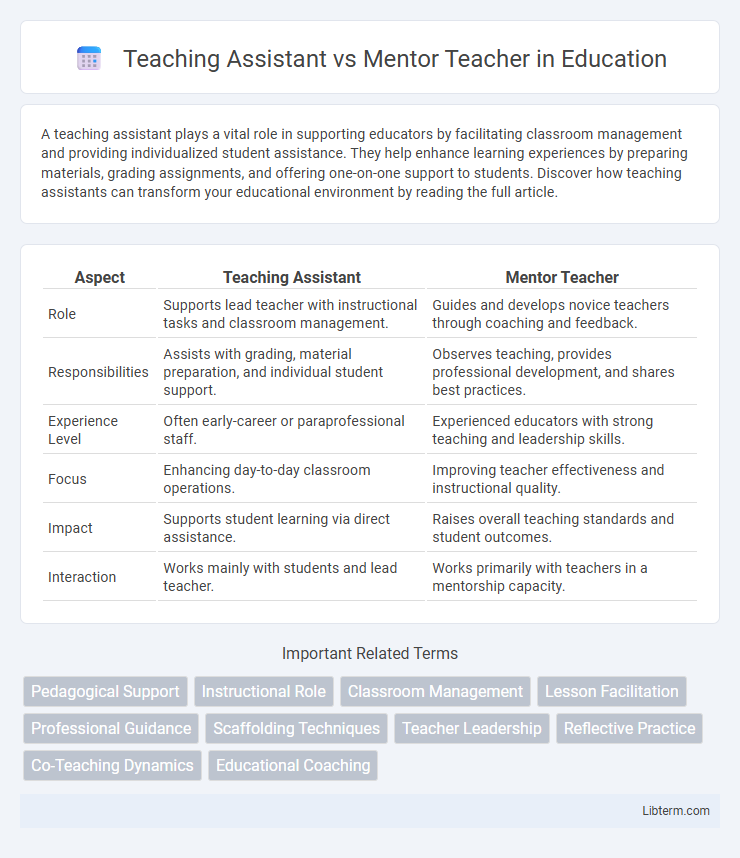A teaching assistant plays a vital role in supporting educators by facilitating classroom management and providing individualized student assistance. They help enhance learning experiences by preparing materials, grading assignments, and offering one-on-one support to students. Discover how teaching assistants can transform your educational environment by reading the full article.
Table of Comparison
| Aspect | Teaching Assistant | Mentor Teacher |
|---|---|---|
| Role | Supports lead teacher with instructional tasks and classroom management. | Guides and develops novice teachers through coaching and feedback. |
| Responsibilities | Assists with grading, material preparation, and individual student support. | Observes teaching, provides professional development, and shares best practices. |
| Experience Level | Often early-career or paraprofessional staff. | Experienced educators with strong teaching and leadership skills. |
| Focus | Enhancing day-to-day classroom operations. | Improving teacher effectiveness and instructional quality. |
| Impact | Supports student learning via direct assistance. | Raises overall teaching standards and student outcomes. |
| Interaction | Works mainly with students and lead teacher. | Works primarily with teachers in a mentorship capacity. |
Introduction: Defining Teaching Assistant and Mentor Teacher
A Teaching Assistant supports classroom teachers by providing instructional aid, managing classroom tasks, and assisting students with learning activities. A Mentor Teacher, often an experienced educator, guides and coaches novice teachers to develop their teaching skills, offering feedback and professional support. While both roles focus on enhancing educational outcomes, Teaching Assistants primarily aid students directly, whereas Mentor Teachers concentrate on fostering teacher development.
Roles and Responsibilities
Teaching assistants support classroom teachers by managing student behavior, preparing materials, and providing one-on-one help to students with diverse learning needs. Mentor teachers guide novice educators by offering instructional strategies, conducting observations, and delivering constructive feedback for professional growth. Both roles enhance educational outcomes but differ in direct classroom involvement versus teacher development.
Qualifications and Training
Teaching assistants typically hold a high school diploma or associate degree, with some receiving on-the-job training or certification programs tailored to classroom support roles. Mentor teachers possess advanced qualifications, often requiring a valid teaching license, several years of classroom experience, and specialized training in mentorship and instructional coaching. The training for mentor teachers emphasizes leadership, curriculum development, and effective feedback techniques, distinguishing their role from the more supportive, task-oriented training provided to teaching assistants.
Core Skills Required
Teaching assistants require strong organizational skills, classroom management, and the ability to support lead teachers through preparing materials and assisting students individually. Mentor teachers need advanced instructional strategies, leadership abilities, and expertise in evaluating and guiding novice teachers to improve pedagogical practices. Both roles demand effective communication, patience, and a deep understanding of curriculum standards to foster student learning and professional development.
Classroom Interaction
A Teaching Assistant supports classroom interaction by assisting teachers with managing student behavior and facilitating group activities, enhancing individualized attention for learners. Mentor Teachers model effective instructional strategies and provide feedback to novice educators, directly shaping teaching practices and student engagement. Both roles contribute critically to a dynamic learning environment but differ in responsibility and influence on pedagogical development.
Impact on Student Learning
Mentor teachers significantly enhance student learning by providing expert guidance, modeling effective teaching strategies, and facilitating reflective practice, which leads to improved instructional quality. Teaching assistants support classroom management and individual student needs, allowing for more personalized attention but typically with less influence on curriculum design or pedagogical development. Research shows that the mentor teacher's role correlates with higher student achievement and deeper comprehension, highlighting their pivotal impact on educational outcomes.
Supervision and Support Structure
Teaching Assistants primarily provide classroom support under the direct supervision of the lead teacher, assisting with instructional tasks and student management. Mentor Teachers hold a more authoritative role, offering comprehensive guidance, professional development, and evaluative feedback to novice or less experienced educators. The support structure for Teaching Assistants is typically task-oriented and limited in scope, while Mentor Teachers engage in long-term developmental supervision aimed at enhancing teaching efficacy.
Collaboration with Lead Teachers
Teaching assistants support lead teachers by reinforcing instructional strategies and managing classroom tasks, enhancing overall student engagement. Mentor teachers collaborate closely with lead teachers by providing guidance on curriculum development, sharing best teaching practices, and facilitating professional growth. Both roles require continuous communication and teamwork to foster a cohesive learning environment.
Professional Development Opportunities
Teaching Assistants often gain professional development opportunities through classroom management training and peer observation, enhancing foundational instructional skills. Mentor Teachers participate in advanced leadership programs and workshops designed to refine mentoring strategies, curriculum design, and assessment techniques. Access to specialized training and collaborative development sessions distinguishes the professional growth paths of both roles.
Choosing the Right Role: Factors to Consider
Choosing between a teaching assistant and a mentor teacher role depends on your career goals, experience level, and desired responsibilities in the classroom. Teaching assistants often support lead teachers by managing classroom tasks and providing individualized student assistance, ideal for those seeking entry-level education positions. Mentor teachers require extensive experience and leadership skills to guide novice educators, making this role suitable for professionals aiming to influence teaching practices and foster teacher development.
Teaching Assistant Infographic

 libterm.com
libterm.com